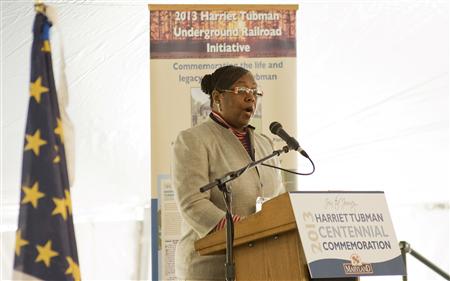Harriet Tubman park to be on Maryland land she worked as a slave
By Lacey Johnson | Reuters – 4 hrs ago
CAMBRIDGE, Maryland (Reuters) - Abolitionist Harriet Tubman's struggle to help roughly 70 slaves escape to freedom using the Underground Railroad was remembered on Saturday at the groundbreaking of a Maryland state park in her honor.
An escaped slave herself, Tubman toiled in bondage on the land that will soon be the 17-acre Harriet Tubman Underground Railroad State Park on the eastern shore of Maryland's Chesapeake Bay.
Construction of the park on open marshland and forests in Dorchester County marks the 100-year anniversary of the abolitionist leader's death.
It also coincides with the opening of the Harriet Tubman Underground Railroad Byway, a 125-mile drive with more than 30 historical stops related to Tubman's early life and the Underground Railroad. Highlights include the Mason-Dixon Line, a one-room school, a historic village store with artifacts from the 1800s and, eventually, the new Harriet Tubman park itself.
"I think the byway is awesome, because we're connecting the dots again. We're telling the complete story," said Patricia Ross-Hawkins, 51, a distant relative of Tubman who spoke to the crowd of more than 200 people at Saturday's celebration. The morning's events included singing by a local Baptist church choir, a theatrical speech by a Harriet Tubman re-enactor and remarks from Govenor Martin O'Malley.
"It's been a long time coming but it's here," she said.
Slated to open in 2015, the park is located on the same land where Tubman worked as a slave before escaping to Pennsylvania at the age of 27. While in bondage, she had been rented out for work throughout the region, including chopping wood on the land that will now be named after her.
Located next to the Blackwater National Wildlife Refuge, the park will include walking trails, a garden and a visitor center with educational exhibits.
"Her descendants had been trying to do something to remember her," said Clara Small, a Salisbury University history professor, who is currently researching African-American history on Maryland's Eastern Shore. "They're trying to make everyone aware of her contributions."
Long considered an American icon, Tubman led roughly 70 slaves to freedom using the Underground Railroad and later went on to become a humanitarian and women's suffragist. A modest Harriet Tubman Museum exists in downtown Cambridge, but local groups have "fought for over 20 years to memorialize her better," Small said.
"This is an opportunity for revitalization to the entire region," said Cambridge Mayor Victoria Jackson-Stanley, who is herself a director descendant of slaves. "Harriet Tubman is too big a persona to be limited to just one little community like Cambridge."
A number of local parks are already dedicated to Tubman in cities including Wilmington, Delaware, Knoxville, Tennessee and Boston, but many lawmakers insist that is not enough.
Last month, U.S. Senator Benjamin Cardin of Maryland introduced legislation to establish historical national parks named for Harriet Tubman - one at Tubman's home in Auburn, New York, and another in eastern Maryland. The U.S. House also is reviewing a version of the bill.
Congress has considered similar legislation on three occasions in the past, but each time it failed to rally support.
"We're very optimistic this time around. Especially given the 100-year anniversary of her death," said Cardin's spokesperson Susan Sullam.
The state park was expected to bring in more than $200,000 tourist dollars annually, according to Camila Clark, spokesperson for the state tourism office. Its wider economic impact, including job creation, was anticipated to be $20 million annually.
The $21 million cost of the state park project will be covered mainly by the Maryland Department of Natural Resources, the State Highway Administration and the U.S. Department of Transportation, said Josh Davidsburg, spokesman for the Department of Natural Resources.
Another boost to the local economy will be the byway, with its dozens of stops in surrounding Dorchester and Caroline counties, said Clark.
Plans are underway to expand the byway northward, tracing Tubman's Underground Railroad route all the way to St. Catharines in Ontario, Canada, Clark said.
(This story has been refiled to add dropped word historical in 13th paragraph)
(Editing by Barbara Goldberg. Editing by Andre Grenon)


No comments:
Post a Comment